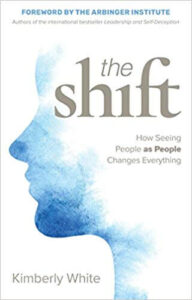When you think about your co-workers, what do you see? Do you picture mere objects who only exist to help you accomplish your goals, or do you see them as human beings?
This week on #WorkTrends, we’re talking to author Kimberly White. Her new book, “The Shift: How Seeing People as People Changes Everything,” tells a story about how changing our perspective on the people around us can have dramatic consequences on employee engagement, the quality of relationships and how we see the world.
You can listen to the full episode below, or keep reading for this week’s topic. Share your thoughts with us using the hashtag #WorkTrends.
What Does ‘The Shift’ Mean?
Here’s the big idea from the book: Can we shift out of a mindset where the only thing we care about is ourselves — and start thinking about what’s going on with other people?
White was researching a company that owned nursing homes. She didn’t have much experience being in nursing homes, but when she visited one of the facilities she was blown away. Every employee she encountered was completely engaged in their work, loved what they were doing and felt grateful to be there. “It was like being wrapped in a warm hug. It was so invigorating to be in an environment where everybody really cared about everybody else.”
She realized they had shifted their mindset.
“The shift is about changing from seeing people as objects to seeing them as people. Often we have automatic knee-jerk reactions to other people that are more like the way we react to objects than the way we ought to react to real people.
“If I have an actual object like a pen, it comes from the factory and it exists for me, for the consumer, to use. That’s what it’s for. If it doesn’t produce ink, if it doesn’t write smoothly, then I’m going to shake it to make it do the thing it’s supposed to do. I don’t talk to the pen and say ‘What’s going on, pen? How are you feeling today? Are you sad? Is that why you’re not producing?’ No, because it is just an object. It doesn’t have an internal life. It doesn’t have feelings. It doesn’t have reasons. Often, we find ourselves treating other people the same way.”
When we see people for who they truly are — the way we understand our best friends, our close family members or our children — our perspective is totally different. “If I were driving down the highway and somebody cut me off, and I looked over and saw that it was my beloved best friend, I wouldn’t think ‘Oh, what a jerk.’ I’d think ‘Oh, my gosh, what’s going on? What has happened in her life to make her drive this way? There must be some sort of an emergency.’
“Because in that case, her internal life and her reasons matter to me. When I see a person as a person, I see their internal motivations and the reasons for their behavior. When I see somebody as an object, I just see what they’ve done that bothers me. All I see is how their behavior is interfering with the stuff I’m trying to do, and I don’t give any thought to why they’re doing it, and what rationale and understandable reasons they might have.”
Powerful stuff, right? Can you imagine how different the world (and our workplaces) would be if we all did that 5 percent more?
How Can Leaders Encourage a Shift?
I asked White how leaders can build an organization where people value and respect each other. Her very first tip? “Leaders have to do it too.” They have to walk the walk and show that they care about employees. “The people who are on the ground floor of any enterprise deserve respect from their leaders,” she says. “So many initiatives fail because people don’t think their boss really cares about them as a person.
“Your employees do not exist just to do the job. They have their own backstories. They have their own perspectives. They have a lot of background, and hopes, and dreams, and fears, and insights. If you see that person as just an object, you’re missing out on all of that stuff. You can’t possibly be an effective leader if you simply don’t know what’s going on with the people.”
Amen to that!
Let’s continue the conversation. Join us on Twitter (#WorkTrends) for our weekly chat on Wednesdays at 1:30 p.m. Eastern, 10:30 a.m. Pacific or anywhere in the world you are joining from to discuss this topic and more.